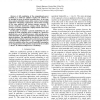Free Online Productivity Tools
i2Speak
i2Symbol
i2OCR
iTex2Img
iWeb2Print
iWeb2Shot
i2Type
iPdf2Split
iPdf2Merge
i2Bopomofo
i2Arabic
i2Style
i2Image
i2PDF
iLatex2Rtf
Sci2ools
142
click to vote
ECRTS
2010
IEEE
2010
IEEE
Partitioning Parallel Applications on Multiprocessor Reservations
A full exploitation of the computational power available in a multi-core platform requires the software to be specified in terms of parallel execution flows. At the same time, modern embedded systems often consist of more parallel applications with timing requirements, concurrently executing on the same platform and sharing common resources. To prevent reciprocal interference among critical activities, a resource reservation mechanism is highly desired in the kernel to achieve temporal isolation. In this paper, we propose a general methodology for partitioning the total computing power available on a multi-core platform into a set of virtual processors, which provide a powstraction to allocate applications independently of the physical platform. The application, described as a set of tasks with precedence relations expressed by a directed acyclic graph, is automatically partitioned into a set of subgraphs that are selected to minimize either the overall bandwidth consumption or the fra...
Directed Acyclic Graph | ECRTS 2010 | Embedded Systems | Modern Embedded Systems | Multi-core Platform |
Related Content
| Added | 09 Nov 2010 |
| Updated | 09 Nov 2010 |
| Type | Conference |
| Year | 2010 |
| Where | ECRTS |
| Authors | Giorgio C. Buttazzo, Enrico Bini, Yifan Wu |
Comments (0)

